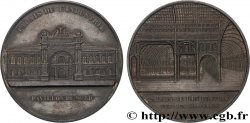fme_979646 - SECOND EMPIRE Médaille, Eugène Beauharnais
Not available.
Item sold on our e-shop (2025)
Price : 6.00 €
Item sold on our e-shop (2025)
Price : 6.00 €
Type : Médaille, Eugène Beauharnais
Date: 1862
Mint name / Town : 75 - Paris
Metal : brass
Diameter : 23 mm
Orientation dies : 12 h.
Weight : 4,56 g.
Edge : lisse
Puncheon : sans poinçon
Coments on the condition:
Patine hétérogène jaune foncée, tâches et oxydations à l’avers, légers coups sur la tranche, nombreuses concrétions et tâches au revers
Obverse
Obverse legend : EUGENE - BEAUHARNAIS.
Obverse description : Tête d’Eugène Beauharnais à gauche. Signé : C T.
Reverse
Reverse legend : SOUS LE REGNE DE NAPOLEON III / INAUGURATION / BOULEVART / DU PRINCE EUGENE / 15 NOVBRE / 1862.
Reverse description : Légende en 5 lignes dans une couronne fleurie.
Commentary
Traces de monture à 6 h et 12 h. La faute d’orthographe à BOULEVARD est bien sur la médaille.
Le boulevard Voltaire fait partie des grands axes créés à Paris par le baron Haussmann sous Napoléon III. D'abord nommé boulevard du Prince-Eugène, en l'honneur d'Eugène de Beauharnais, oncle de l'empereur, il prend le nom de boulevard Voltaire le 25 octobre 1870. Il relie la place de la République et la place de la Nation. Très rapidement, le boulevard Voltaire est devenu une voie qu'empruntent de nombreux défilés de partis politiques de gauche, de syndicats ou de mouvements de contestation. Le boulevard est bordé de platanes, sa longueur est de 2 850 m, sa largeur de 30 m jusqu'à la rue de Montreuil puis de 40 m au-delà..
Le boulevard Voltaire fait partie des grands axes créés à Paris par le baron Haussmann sous Napoléon III. D'abord nommé boulevard du Prince-Eugène, en l'honneur d'Eugène de Beauharnais, oncle de l'empereur, il prend le nom de boulevard Voltaire le 25 octobre 1870. Il relie la place de la République et la place de la Nation. Très rapidement, le boulevard Voltaire est devenu une voie qu'empruntent de nombreux défilés de partis politiques de gauche, de syndicats ou de mouvements de contestation. Le boulevard est bordé de platanes, sa longueur est de 2 850 m, sa largeur de 30 m jusqu'à la rue de Montreuil puis de 40 m au-delà..








 Report a mistake
Report a mistake Print the page
Print the page Share my selection
Share my selection Ask a question
Ask a question Consign / sell
Consign / sell
 Full data
Full data









